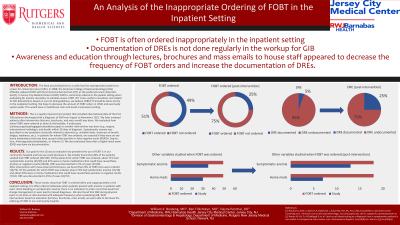Tuesday Poster Session
Category: GI Bleeding
P3458 - An Analysis of the Inappropriate Ordering of Fecal Occult Blood Test in the Inpatient Setting
Tuesday, October 24, 2023
10:30 AM - 4:00 PM PT
Location: Exhibit Hall

Has Audio

William KB Boateng, MD
Jersey City Medical Center
Bayonne, NJ
Presenting Author(s)
William KB. Boateng, MD1, Ben Flikshteyn, MD2, Dayna Panchal, DO2
1Jersey City Medical Center, Bayonne, NJ; 2Rutgers New Jersey Medical School, Newark, NJ
Introduction: The fecal occult blood test (FOBT) is a useful tool for colorectal cancer (CRC) screening. FOBT is intended to be used for asymptomatic patients in the outpatient setting as a qualitative test to detect heme in the stool. FOBT in the inpatient setting is used for variable causes of the gastrointestinal tract (GIB) besides CRC. FOBT is less useful in situations not related to CRC detection. Certain medications (antiplatelets and anticoagulants) and diets increase the false positivity and negativity of FOBT. Digital rectal exams (DRE), an important part of the physical exam when evaluating for melena or hematochezia, are seldom done. We want to decrease the amount of FOBT orders in our hospital and system-wide. This would save on healthcare costs and unnecessary testing.
Methods: This is a quality improvement project (QI) that includes observational data of the first 100 patients discharged with a diagnosis of GIB from August to November 2021. The primary outcome is to evaluate how many FOBTs were ordered. The secondary outcome is to evaluate how often DRE was done via documentation. Other variables we evaluated were how often endoscopy was done, the number of patients who had symptomatic anemia before FOBT was ordered, and patients on home meds that could have altered FOBT results.
Results: We found that FOBT was ordered for 49% of patients. About 67% of the FOBT tests that were ordered were positive and about 33% were negative. Endoscopy was done 88% of the time FOBT was positive. Symptomatic anemia was found in about 71% of the patients in which FOBT was ordered. There were 61% of patients who were on home medications that may have caused false positive or false negative results. DRE was documented in 5% of cases.
Discussion: These results show that FOBT is ordered often and inappropriately in the inpatient setting. We also found that DRE is not done or documented often enough when evaluating GIB. FOBT should not have been ordered In the 71% of patients with symptomatic anemia or the 61% of patients who were on home meds that could have caused false positives or negatives. There is no indication of FOBT in the workup for GIB in the inpatient setting. In a subsequent study, after awareness and education, we plan on analyzing how often FOBT is used and expect the number of FOBTs to be decreased in our hospital.
Disclosures:
William KB. Boateng, MD1, Ben Flikshteyn, MD2, Dayna Panchal, DO2. P3458 - An Analysis of the Inappropriate Ordering of Fecal Occult Blood Test in the Inpatient Setting, ACG 2023 Annual Scientific Meeting Abstracts. Vancouver, BC, Canada: American College of Gastroenterology.
1Jersey City Medical Center, Bayonne, NJ; 2Rutgers New Jersey Medical School, Newark, NJ
Introduction: The fecal occult blood test (FOBT) is a useful tool for colorectal cancer (CRC) screening. FOBT is intended to be used for asymptomatic patients in the outpatient setting as a qualitative test to detect heme in the stool. FOBT in the inpatient setting is used for variable causes of the gastrointestinal tract (GIB) besides CRC. FOBT is less useful in situations not related to CRC detection. Certain medications (antiplatelets and anticoagulants) and diets increase the false positivity and negativity of FOBT. Digital rectal exams (DRE), an important part of the physical exam when evaluating for melena or hematochezia, are seldom done. We want to decrease the amount of FOBT orders in our hospital and system-wide. This would save on healthcare costs and unnecessary testing.
Methods: This is a quality improvement project (QI) that includes observational data of the first 100 patients discharged with a diagnosis of GIB from August to November 2021. The primary outcome is to evaluate how many FOBTs were ordered. The secondary outcome is to evaluate how often DRE was done via documentation. Other variables we evaluated were how often endoscopy was done, the number of patients who had symptomatic anemia before FOBT was ordered, and patients on home meds that could have altered FOBT results.
Results: We found that FOBT was ordered for 49% of patients. About 67% of the FOBT tests that were ordered were positive and about 33% were negative. Endoscopy was done 88% of the time FOBT was positive. Symptomatic anemia was found in about 71% of the patients in which FOBT was ordered. There were 61% of patients who were on home medications that may have caused false positive or false negative results. DRE was documented in 5% of cases.
Discussion: These results show that FOBT is ordered often and inappropriately in the inpatient setting. We also found that DRE is not done or documented often enough when evaluating GIB. FOBT should not have been ordered In the 71% of patients with symptomatic anemia or the 61% of patients who were on home meds that could have caused false positives or negatives. There is no indication of FOBT in the workup for GIB in the inpatient setting. In a subsequent study, after awareness and education, we plan on analyzing how often FOBT is used and expect the number of FOBTs to be decreased in our hospital.
Disclosures:
William Boateng indicated no relevant financial relationships.
Ben Flikshteyn indicated no relevant financial relationships.
Dayna Panchal indicated no relevant financial relationships.
William KB. Boateng, MD1, Ben Flikshteyn, MD2, Dayna Panchal, DO2. P3458 - An Analysis of the Inappropriate Ordering of Fecal Occult Blood Test in the Inpatient Setting, ACG 2023 Annual Scientific Meeting Abstracts. Vancouver, BC, Canada: American College of Gastroenterology.
